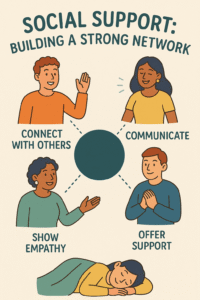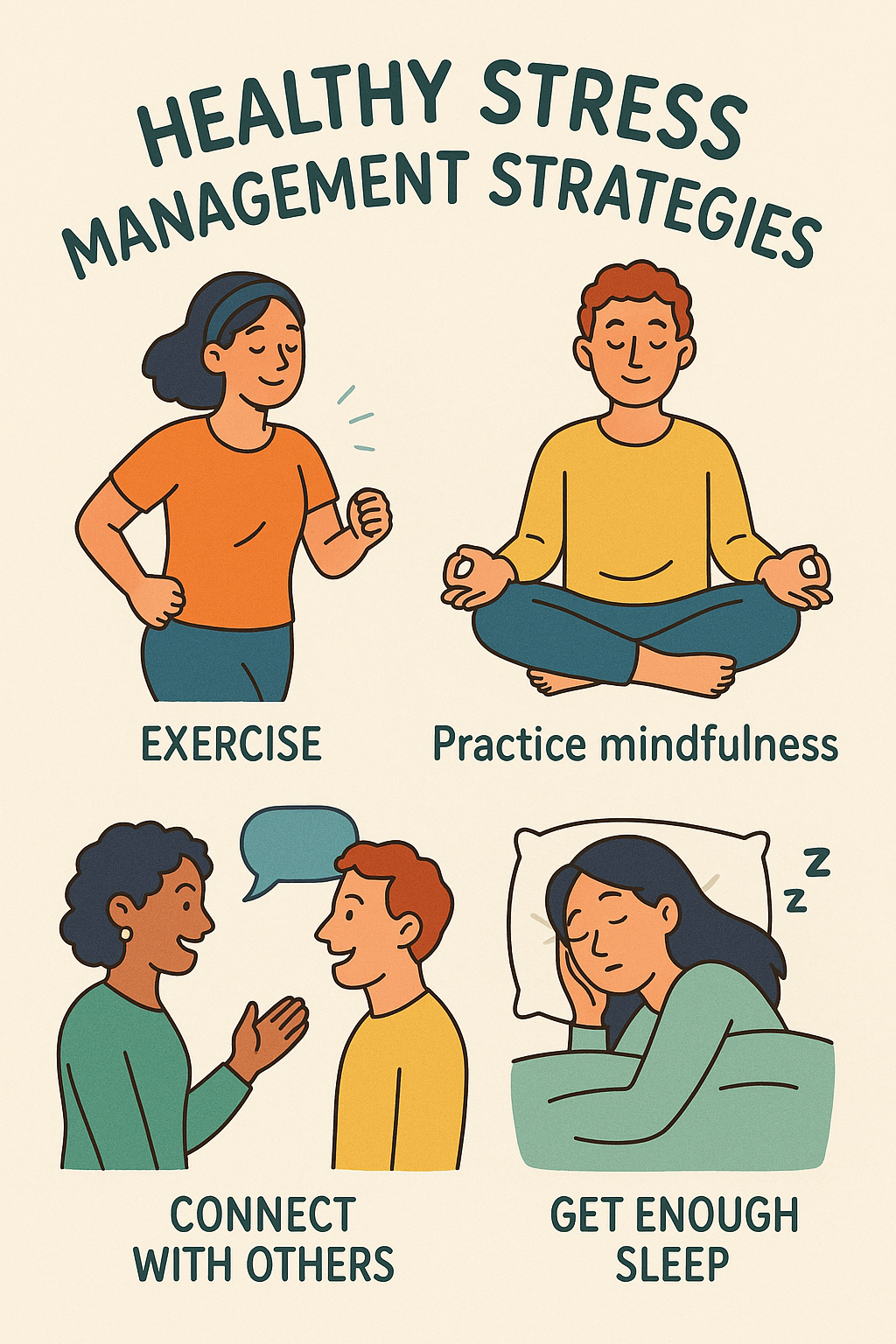Healthy stress management strategies?
Stress is an inevitable part of life. Whether it’s the pressures of work, personal relationships, or daily responsibilities, everyone experiences stress at some point. While it’s impossible to eliminate stress, how we manage it can make a world of difference in our physical and mental well-being.
Chronic stress can take a significant toll on your body, leading to headaches, digestive issues, sleep disturbances, and even heart problems. On the mental health front, stress can manifest as anxiety, irritability, and depression. Fortunately, there are healthy, effective ways to manage stress and maintain your equilibrium amidst life’s challenges.
We’ll explore four healthy stress management strategies you can incorporate into your daily routine. These approaches are simple, scientifically backed, and highly effective. Healthy stress management strategies?
1. Exercise: Move to Relieve Stress
Exercise is one of the most powerful stress-relieving strategies available to us. When we engage in physical activity, our bodies release endorphins, which are chemicals that help reduce pain and induce feelings of happiness and well-being. Exercise also reduces levels of the body’s stress hormones, like cortisol.
How Exercise Helps Relieve Stress
Endorphin Release: These “feel-good” hormones act as natural painkillers and mood elevators.
Improved Sleep: Regular physical activity helps regulate sleep patterns, which is essential for reducing stress and boosting mood.
Increased Confidence: Achieving exercise goals, whether it’s running a mile or lifting a certain weight, boosts self-esteem and a sense of accomplishment.
Mindfulness Benefits: Engaging in activities like yoga, walking, or swimming can be meditative and help ground your thoughts, reducing anxiety.
Exercise Ideas for Stress Management
Aerobic Exercises: Running, cycling, or dancing increases your heart rate and releases endorphins.
Yoga and Pilates: These activities combine gentle stretching, strength training, and mindfulness, making them ideal for managing stress.
Strength Training: Lifting weights or doing bodyweight exercises can help increase your overall sense of control over your body.
Walking: A simple walk in the park or around the block can have immediate stress-relieving effects.
Remember, the key is consistency. You don’t need to hit the gym every day; just aim for 20-30 minutes of moderate physical activity most days of the week.
2. Mindfulness and Meditation: Cultivating Calm and Clarity
Mindfulness and meditation are powerful tools for managing stress and improving mental clarity. These practices encourage you to focus on the present moment, helping you detach from worries about the future or regrets about the past.
How Mindfulness and Meditation Help
Reduced Anxiety: Regular mindfulness practice trains your mind to acknowledge thoughts without judgment, reducing their emotional power.
Enhanced Emotional Regulation: By practicing mindfulness, you learn to observe your emotional reactions rather than becoming consumed by them.
Improved Focus and Concentration: Meditation sharpens your ability to focus, leading to better decision-making and stress management.
Physical Relaxation: Meditation can trigger the parasympathetic nervous system (the “rest and digest” system), helping to lower blood pressure and reduce muscle tension.
Simple Mindfulness Practices to Try
Breathing Exercises: Focus on your breath for a few minutes each day. Deep breathing helps activate your parasympathetic nervous system, promoting relaxation.
Body Scan Meditation: Progressively focus on different areas of your body, starting from your toes and moving up to your head, to notice any tension and consciously release it.
Mindful Walking: Take a walk, but instead of rushing to get somewhere, focus entirely on the sensation of walking—the movement of your body, the rhythm of your steps, and the sights and sounds around you.
Guided Meditation: Use apps like Headspace or Calm to follow along with guided meditation sessions that focus on stress reduction.
With consistent practice, mindfulness and meditation can significantly improve your ability to handle stressful situations with calm and resilience.
3. Healthy Nutrition: Fuel Your Body, Calm Your Mind
What you eat plays a crucial role in how your body responds to stress. A poor diet can increase inflammation, fatigue, and irritability, while proper nutrition can help balance your hormones, stabilize your mood, and boost your energy levels.
Nutritional Strategies for Stress Management
Avoid Caffeine and Sugar: While caffeine and sugar provide short-term energy boosts, they can also lead to crashes that exacerbate feelings of stress. Opt for more stable sources of energy, like whole grains, fruits, and vegetables.
Increase Omega-3 Fatty Acids: Omega-3s, found in fatty fish like salmon, flaxseeds, and walnuts, are known to help reduce inflammation and lower the risk of depression and anxiety.
Magnesium-Rich Foods: Magnesium helps relax muscles and regulate stress hormones. Foods like leafy greens, almonds, and avocados are excellent sources of magnesium.
Eat Regularly: Skipping meals or going long periods without eating can contribute to mood swings and heightened stress. Eating regular, balanced meals helps maintain stable blood sugar levels, which can prevent stress-related irritability.
Foods That Promote Stress Relief
Bananas: Packed with potassium, bananas help regulate blood pressure and can improve mood.
Dark Chocolate: In moderation, dark chocolate can help reduce stress hormones and provide a mood boost.
Berries: Rich in antioxidants, berries help reduce oxidative stress in the body.
Green Tea: Contains L-theanine, which has been shown to help reduce stress and promote relaxation.
Remember that a balanced, nutritious diet not only supports physical health but also provides the mental clarity and resilience needed to manage stress effectively.
4. Social Support: Building a Strong Network

Having a support system is one of the most effective ways to manage stress. Connecting with friends, family, or colleagues provides emotional relief and reassurance during difficult times.
Why Social Support is Important
Emotional Comfort: Talking about your stressors with someone who listens without judgment can help alleviate anxiety and give you a sense of relief.
Perspective: Sometimes, all you need is someone else’s viewpoint to help put your situation in perspective.
Accountability: Having supportive friends or family can encourage you to stick to your stress management routines, whether it’s exercising regularly or practicing mindfulness.
Building a Supportive Network
Stay Connected: Make time to call, text, or meet with loved ones regularly. You don’t need a large social circle—quality matters more than quantity.
Seek Professional Help: If your stress becomes overwhelming, a therapist or counselor can provide professional support and coping strategies.
Join a Community or Support Group: Whether it’s a workout group, a book club, or an online support network, being part of a group with shared interests can provide both social interaction and stress relief.
Remember, it’s not just about having a network; it’s about nurturing meaningful relationships with people who make you feel heard, supported, and valued.
Conclusion: Taking Control of Your Stress
Stress is an unavoidable part of life, but how you manage it can have a profound effect on your health and well-being. By incorporating exercise, mindfulness, healthy eating, and a solid support network into your life, you can reduce the negative impact of stress and build resilience against future challenges.
Take small, consistent steps toward implementing these strategies. Over time, you’ll notice significant improvements in both your mental and physical health. Remember, stress management isn’t about eliminating stress—it’s about developing healthy ways to cope and thrive despite it.
FAQs About Stress Management
Q1: Can stress be eliminated from my life? While it’s impossible to eliminate all stress, you can reduce its impact by adopting healthy stress management strategies. The goal is not to remove stress but to handle it in a way that doesn’t overwhelm you.
Q2: How long does it take to see results from stress management techniques? The time it takes to see results varies depending on the individual and the strategies you use. Exercise and mindfulness can offer immediate relief, while long-term changes in nutrition or social support may take several weeks to show significant effects.
Q3: Can meditation help with chronic stress? Yes, meditation is highly effective for managing chronic stress. Regular practice helps rewire your brain to better handle stressful situations, reduce anxiety, and promote relaxation.
Q4: Is it necessary to go to a therapist for stress management? While self-help strategies can be very effective, speaking to a therapist can be beneficial, especially if you’re dealing with long-term or intense stress. Therapists can offer personalized strategies and support tailored to your specific needs.
Q5: What is the best exercise for stress relief? There’s no one-size-fits-all answer, but yoga, walking, and swimming are particularly effective because they combine physical movement with relaxation. However, any form of exercise you enjoy can help reduce stress.
